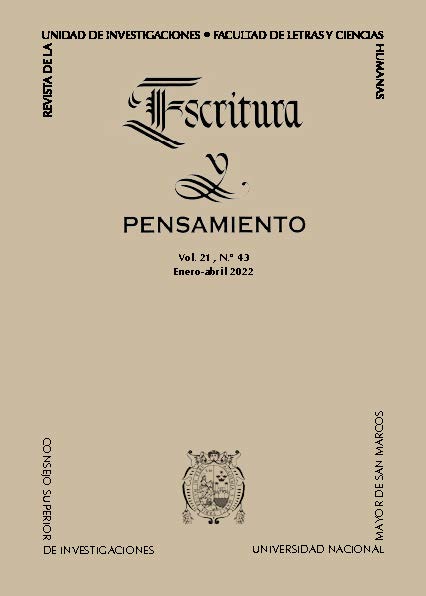Representations of neoliberalism in contemporary Peruvian narrative
DOI:
https://doi.org/10.15381/escrypensam.v21i43.22791Keywords:
Peruvian narrative, neoliberalism, Peruvian literature, contemporary, metaphor, narratologyAbstract
Although there are important academic works about the representation ―in the fictional narrative― of Latin American societies shaped by the neoliberal system since the 1970s, there is a void about Peruvian literature. Despite the fact that in the international consensus Peru is presented as an exemplary country since it implemented the neoliberal economic model, said system meant the elimination of social and labor rights and the shrinking of the State ―to the point of not being a counterweight to power or corruption of economic agents or de facto powers in a free market scenario. Following Wendy Brown, neoliberalism is a global phenomenon that implies an economic policy, a form of governance and an order of reason; in this order, the economy is the measure to assess spheres and activities previously not subject to that criterion. Thus, it is pertinent to analyze how such aspects are represented ―and with what metaphors― in narrative since the 1990s. In a corpus of novels by Pilar Dughi, Victoria Guerrero and Carlos Villacorta, and short stories by Ulises Gutiérrez Llantoy, Carlos Yushimito and Karina Pacheco are key elements of the narrative: precarious work and the precarious, the reduction of the State, escape and economic success, inequality, the maximization of the value of capital, the managerial vision of things, the speeches of the entrepreneurship and investment attraction, among others.
References
Anderson, P. (2003) Neoliberalismo: un balance provisorio. En Sader E. y Gentili, P. (compiladores) La trama del neoliberalismo. Mercado, crisis y exclusión social. (pp.1-111) http://biblioteca.clacso.edu.ar/clacso/se/20100609030645/latrama.pdf
Booth, W. C. (2005). Resurrection of the Implied Author. Why Bother?. En Phelan J., Rabinowitz P. (eds.) A companion to narrative theory. (pp.75-88). Blackwell Publishing.
Booth, W. C. (1998). Why Ethical Criticism Can Never Be Simple. Style, 32(2), 351-364. http://www.jstor.org/stable/42946431
Brown. W. (2015). Undoing the demos: neoliberalism’s stealth revolution. Zone Books.
Dabove, J.P. (2010). Plata quemada: Banditry, neoliberalism and the dilemma of literature at the end of the twentieth century. En M. Moraña y B. Gustafson (Ed.), Rethinking Intellectuals in Latin America (pp. 149-170). Frankfurt a. M., Vervuert Verlagsgesellschaft. https://doi.org/10.31819/9783954871698-008
Dughi, P. (2017 [1998]). Puñales escondidos. Cocodrilo Ediciones.
Guerrero, V. (2014). Un golpe de dados (novelita sentimental pequeño-burguesa). Ceques editores.
Gutierrez, U. (2020 [2008]). The Cure en Huancayo. Planeta.
Hartman, C. O. (1982). Cognitive Metaphor. New Literary History, 13(2), 327–339. https://doi.org/10.2307/468915
Harvey, D. (2012) La condición de la posmodernidad. Investigación sobre los orígenes del cambio cultural. Amorrortu.
Ludmer, J. (2021 [2012]). Literaturas postautónomas: otro estado de la escritura. Blog de Eterna Cadencia. Recuperado de: https://www.eternacadencia.com.ar/blog/ficcion/item/literaturas-postautonomas.html
Noemi, D. (2016). En tiempo fugitivo. Narrativas latinoamericanas contemporáneas. Universidad Pedro Hurtado.
Nünning. A. (2005). Reconceptualizing unreliable narration: synthetizing cognitive and rhetorical approaches. En Phelan J., Rabinowitz P. (eds.) A companion to narrative theory. (pp. 88-107). Blackwell Publishing.
Ocasio-Rivera, W. (2015). Metáforas extremas del neoliberalismo en la literatura latinoamericana. [Tesis para optar el grado académico de Doctor en Filosofía en España). Universidad de Illinois. http://hdl.handle.net/2142/78465
Pacheco, K. (2018). Lluvia. Seix Barral
Villacorta, C. (2014). Alicia, esto es el capitalismo. Intermezzo Tropical.
Yushimito, C. (2013). Los bosques tienen sus propias puertas. Peisa.
Downloads
Published
Issue
Section
License
Copyright (c) 2022 Jacqueline Fowks

This work is licensed under a Creative Commons Attribution 4.0 International License.
AUTHORS RETAIN THEIR RIGHTS:
a. The authors retain their trademark and patent rights, and also over any process or procedure described in the article.
b. The authors retain the right to share, copy, distribute, execute and publicly communicate the article published in the Escritura y Pensamiento (for example, place it in an institutional repository or publish as part a book), with acknowledgment of its initial publication by Escritura y Pensamiento.
c. Authors retain the right to make a subsequent publication of their work, to use the article or any part of it (for example: a compilation of their work, lecture notes, thesis, or for a book), provided that they indicate the source of publication (authors of the work, journal, volume, number and date).





